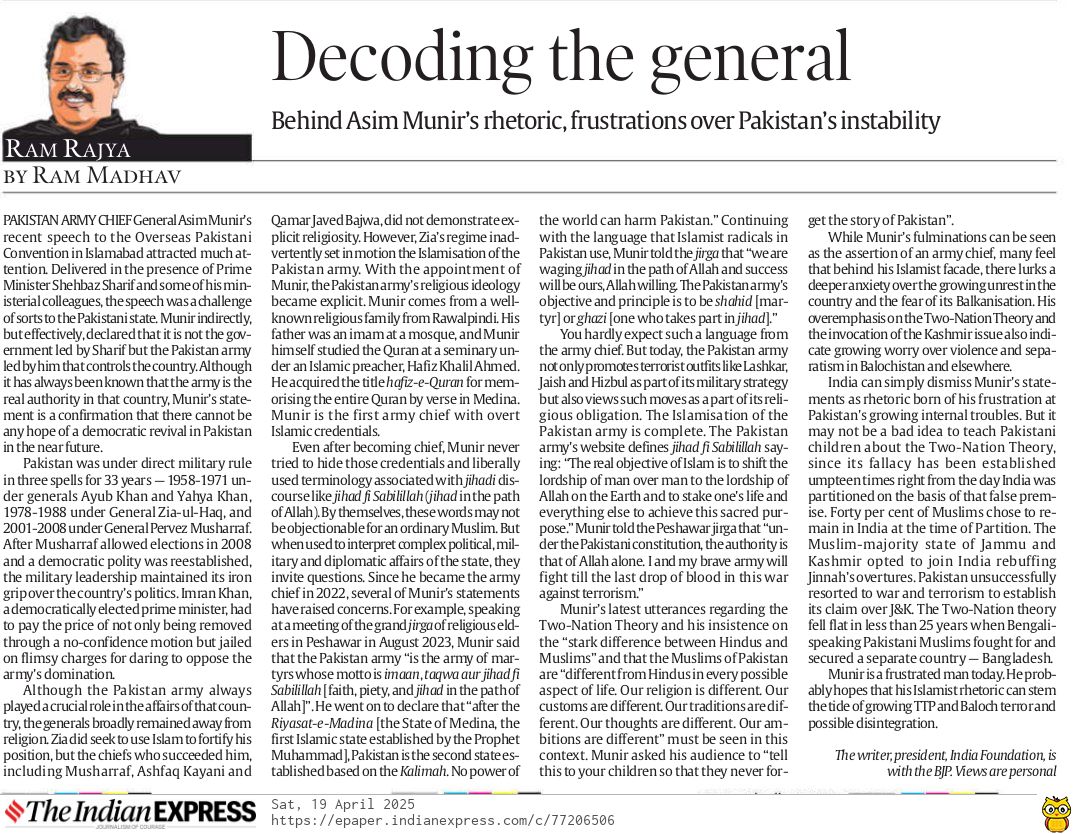
|
Getting your Trinity Audio player ready...
|
(The article was originally published in Indian Express on April 19, 2025 as a part of Dr Madhav’s column titled ‘Ram Rajya’. Views expressed are personal.)
Pakistan army chief General Asim Munir’s recent speech to the Overseas Pakistani Convention in Islamabad attracted much attention. Delivered in the presence of Prime Minister Shehbaz Sharif and some of his ministerial colleagues, the speech was a challenge of sorts to the Pakistani state. Munir indirectly, but effectively, declared that it is not the government led by Sharif but the Pakistan army led by him that controls the country. Although it has always been known that the army is the real authority in that country, Munir’s statement is a confirmation that there cannot be any hope of a democratic revival in Pakistan in the near future.
Pakistan was under direct military rule in three spells for 33 years — 1958-1971 under generals Ayub Khan and Yahya Khan, 1978-1988 under General Zia-ul-Haq, and 2001-2008 under General Pervez Musharraf. After Musharraf allowed elections in 2008 and a democratic polity was reestablished, the military leadership maintained its iron grip over the country’s politics. Imran Khan, a democratically elected prime minister, had to pay the price of not only being removed through a no-confidence motion but jailed on flimsy charges for daring to oppose the army’s domination.
Although the Pakistan army always played a crucial role in the affairs of that country, the generals broadly remained away from religion. Zia did seek to use Islam to fortify his position, but the chiefs who succeeded him, including Musharraf, Ashfaq Kayani and Qamar Javed Bajwa, did not demonstrate explicit religiosity. However, Zia’s regime inadvertently set in motion the Islamisation of the Pakistan army. With the appointment of Munir, the Pakistan army’s religious ideology became explicit. Munir comes from a well-known religious family from Rawalpindi. His father was an imam at a mosque, and Munir himself studied the Quran at a seminary under an Islamic preacher, Hafiz Khalil Ahmed. He acquired the title hafiz-e-Quran for memorising the entire Quran by verse in Medina. Munir is the first army chief with overt Islamic credentials.
Even after becoming chief, Munir never tried to hide those credentials and liberally used terminology associated with jihadi discourse like jihad fi Sabilillah (jihad in the path of Allah). By themselves, these words may not be objectionable for an ordinary Muslim. But when used to interpret complex political, military and diplomatic affairs of the state, they invite questions. Since he became the army chief in 2022, several of Munir’s statements have raised concerns. For example, speaking at a meeting of the grand jirga of religious elders in Peshawar in August 2023, Munir said that the Pakistan army “is the army of martyrs whose motto is imaan, taqwa aur jihad fi Sabilillah [faith, piety, and jihad in the path of Allah]”. He went on to declare that “after the Riyasat-e-Madina [the State of Medina, the first Islamic state established by the Prophet Muhammad], Pakistan is the second state established based on the Kalimah. No power of the world can harm Pakistan.” Continuing with the language that Islamist radicals in Pakistan use, Munir told the jirga that “we are waging jihad in the path of Allah and success will be ours, Allah willing. The Pakistan army’s objective and principle is to be shahid [martyr] or ghazi [one who takes part in jihad].”
You hardly expect such a language from the army chief. But today, the Pakistan army not only promotes terrorist outfits like Lashkar, Jaish and Hizbul as part of its military strategy but also views such moves as a part of its religious obligation. The Islamisation of the Pakistan army is complete. The Pakistan army’s website defines jihad fi Sabilillah saying: “The real objective of Islam is to shift the lordship of man over man to the lordship of Allah on the Earth and to stake one’s life and everything else to achieve this sacred purpose.” Munir told the Peshawar jirga that “under the Pakistani constitution, the authority is that of Allah alone. I and my brave army will fight till the last drop of blood in this war against terrorism.”
Munir’s latest utterances regarding the Two-Nation Theory and his insistence on the “stark difference between Hindus and Muslims” and that the Muslims of Pakistan are “different from Hindus in every possible aspect of life. Our religion is different. Our customs are different. Our traditions are different. Our thoughts are different. Our ambitions are different” must be seen in this context. Munir asked his audience to “tell this to your children so that they never forget the story of Pakistan”.
While Munir’s fulminations can be seen as the assertion of an army chief, many feel that behind his Islamist facade, there lurks a deeper anxiety over the growing unrest in the country and the fear of its Balkanisation. His overemphasis on the Two-Nation Theory and the invocation of the Kashmir issue also indicate growing worry over violence and separatism in Balochistan and elsewhere.
India can simply dismiss Munir’s statements as rhetoric born of his frustration at Pakistan’s growing internal troubles. But it may not be a bad idea to teach Pakistani children about the Two-Nation Theory, since its fallacy has been established umpteen times right from the day India was partitioned on the basis of that false premise. Forty per cent of Muslims chose to remain in India at the time of Partition. The Muslim-majority state of Jammu and Kashmir opted to join India rebuffing Jinnah’s overtures. Pakistan unsuccessfully resorted to war and terrorism to establish its claim over J&K. The Two-Nation theory fell flat in less than 25 years when Bengali-speaking Pakistani Muslims fought for and secured a separate country — Bangladesh.
Munir is a frustrated man today. He probably hopes that his Islamist rhetoric can stem the tide of growing TTP and Baloch terror and possible disintegration.




